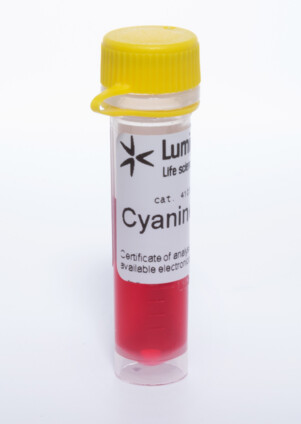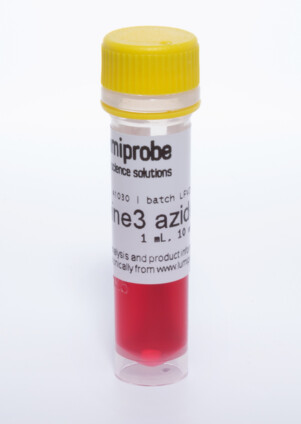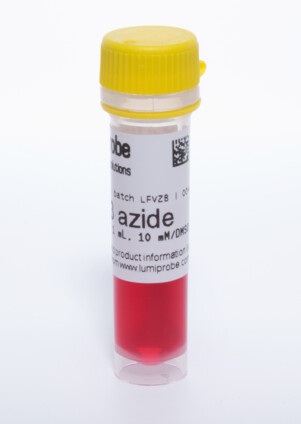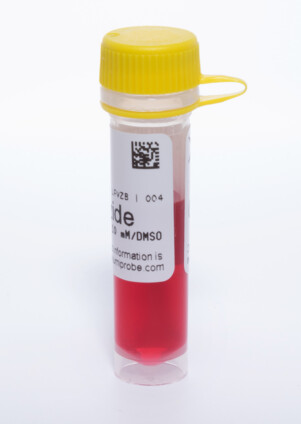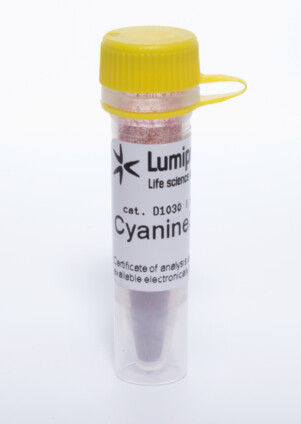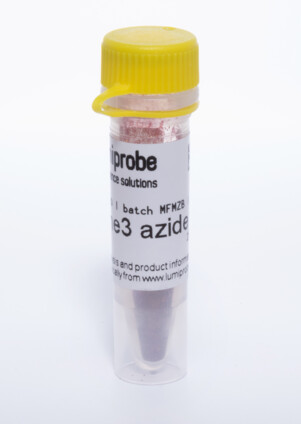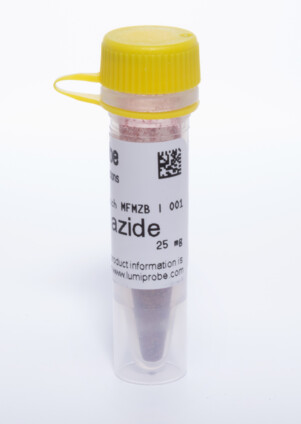- Products
- Reactive dyes
- Dye azides
- Cyanine3 azide
Cyanine3 azide
| 货号 | 规格 | 价格 | 货期 |
|---|---|---|---|
| 11030 | 100 uL, 10 mM/DMSO | 110.00$ | in stock |
| 31030 | 500 uL, 10 mM/DMSO | 210.00$ | in stock |
| 41030 | 1 mL, 10 mM/DMSO | 410.00$ | in stock |
| A1030 | 1 mg | 110.00$ | in stock |
| B1030 | 5 mg | 210.00$ | in stock |
| C1030 | 10 mg | 310.00$ | in stock |
| D1030 | 25 mg | 410.00$ | in stock |
| E1030 | 50 mg | 695.00$ | in stock |
| F1030 | 100 mg | 1190.00$ | in stock |
Cyanine3 dye azide for Click Chemistry, an analog of Cy3® azide. Cy3® is one of the most broadly used fluorophores which can be detected by various fluorometers, imagers, and microscopes. Due to inherently high extinction coefficient, Cyanine3 is also easily detected by naked eye on gels, and in solution. This is non-sulfonated dye which requires organic co-solvent (DMF, DMSO, or other) for efficient labeling in water. Water-soluble version of this reagent is also available.
Product is available both as solid compound, and as 10 mM solution in DMSO which is ready to use in our recommended protocol.
Cyanine3 fluorescent properties are identical to Cy3®, and similar to DyLight 549.
用于 Click Chemistry 的 Cyanine3 染料叠氮化物,是 Cy3® 叠氮化物的类似物。 Cy3® 是使用最广泛的荧光团之一,可以通过各种荧光计、成像仪和显微镜进行检测。 由于固有的高消光系数,Cyanine3 也很容易通过肉眼在凝胶上和溶液中检测到。 这是一种非磺化染料,需要有机助溶剂(DMF、DMSO 或其他)在水中进行有效标记。 该试剂的水溶性版本也可用。
产品既可以作为固体化合物提供,也可以作为 10 mM DMSO 溶液提供,可在我们推荐的方案中使用。
Cyanine3 荧光特性与 Cy3® 相同,与 DyLight 549 相似。
Cy3 absorbance and emission spectra
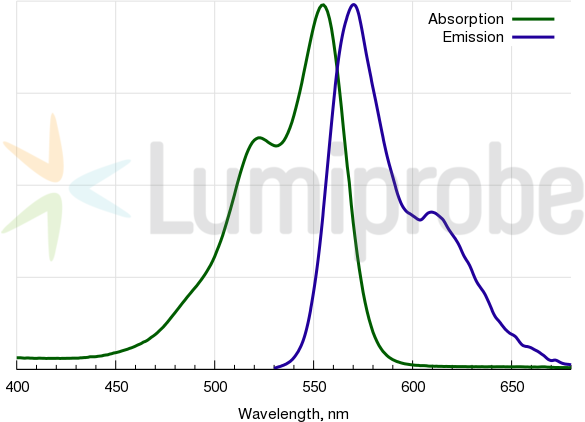
Customers also purchased with this product
PEP azide
PEP (phenylethynylpyrene), polyaromatic hydrocarbon fluorescent dye for Click-Chemistry labeling.
PEP(苯乙炔基芘),用于 Click-Chemistry 标记的多环芳烃荧光染料。
Cyanine3 amine
Cyanine3 is an fluorophore with free amino group (amino-dye). It can be conjugated with NHS esters, carboxy groups (after activation), and epoxides.
Cy3 是一种带有游离氨基的荧光团(氨基染料)。 它可以与 NHS 酯、羧基(活化后)和环氧化物结合。
BDP 581/591 alkyne
BDP 581/591 is a borondipyrromethene fluorophore which is useful for fluorescence polarization assays, microscopy, and two photon experiments. This alkyne is a derivative for copper-catalyzed Click chemistry.
BDP 581/591 是一种硼二吡咯亚甲基荧光团,可用于荧光偏振测定、显微镜检查和两个光子实验。 该炔烃是铜催化点击化学的衍生物。
General properties
| Appearance: | red powder / solution 红粉/溶液 |
| Molecular weight: | 575.19 |
| CAS number: | 1167421-28-4 (chloride) |
| Molecular formula: | C33H43N6OCl |
| Solubility: | soluble in organic solvents (DMF, DMSO, dichloromethane), practically insoluble in water (40 mg/L = 60 uM) |
| Quality control: | NMR 1H and HPLC-MS (95%) |
| Storage conditions: | Storage: 24 months after receival at -20°C in the dark. Transportation: at room temperature for up to 3 weeks. Avoid prolonged exposure to light. Desiccate.
储存:收到后 24 个月,在 -20°C 避光保存。 运输:在室温下长达 3 周。 避免长时间暴露在光线下。 干燥。 |
| MSDS: | Download |
| Product specifications |
Spectral properties
| Excitation/absorption maximum, nm: | 555 |
| ε, L⋅mol−1⋅cm−1: | 150000 |
| Emission maximum, nm: | 570 |
| Fluorescence quantum yield: | 0.31 |
| CF260: | 0.04 |
| CF280: | 0.09 |
相关文献:
- Kim, S.M.; Park, J.; Kim, M.S.; Song, H.; Jo, A.; Park, H.; Kim, T.S.; Choi, S.H.; Park, S.B. Phenotypic Discovery of an Antivirulence Agent against Vibrio vulnificus via Modulation of Quorum-Sensing Regulator SmcR. ACS Infectious Diseases, 2020, 6(11), 3076–3082. doi: 10.1021/acsinfecdis.0c00587
- Tan, M.S.Y.; Davison, D.; Sanchez, M.I.; Anderson, B.M.; Howell, S.; Snijders, A.; Edgington-Mitchell, L.E.; Deu, E. Novel broad-spectrum activity-based probes to profile malarial cysteine proteases. PLoS One, 2020, 15(1), e0227341. doi: 10.1371/journal.pone.0227341
- Saqr, A.; Vakili, M.R.; Huang, Y.-H.; Lai, R.; Lavasanifar, A. Development of Traceable Rituximab-Modified PEO-Polyester Micelles by Postinsertion of PEG-phospholipids for Targeting of B-cell Lymphoma. ACS Omega, 2019, 4(20), 18867–18879. doi: 10.1021/acsomega.9b02910
- Morimoto, K.; Cole, K.S.; Kourelis, J.; Witt, C.H.; Brown, D.; Krahn, D.; Stegmann, M.; Kaschani, F.; Kaiser, M.; Burton, J.; Mohammed, S.; Yamaguchi-Shinozaki, K.; Weerapana, E.; van der Hoorn, R.A.L. Triazine Probes Target Ascorbate Peroxidases in Plants. Plant Physiology, 2019, 180(4), 1848–1859. doi: 10.1104/pp.19.00481


